Non Resident Investing in a Indian Company-Compliance under FCGPR – Whether he can use his NRO Account?
Present Case:
A private limited is incorporated in India. Mr. X who is in US and US citizen has an NRO account in India. He wants to transfer his money from his NRO account to the company for shares subscription
General Note on NRO account:
| S.no | Particulars | Remarks on NRO account |
| 1 | Who can open? | i) Any person resident outside India for putting through bonafide transactions in rupees.
ii) Individuals/ entities of Pakistan nationality/ origin and entities of Bangladesh origin require the prior approval of the Reserve Bank of India. |
| 2 | Currency | Rupees |
| 3 | Permissable Credits | i) Inward remittances from outside India, legitimate dues in India and transfers from other NRO accounts are permissible credits to NRO account. |
| 4 | Permissable Debits | i) The account can be debited for the purpose of local payments, transfers to other NRO accounts or remittance of current income abroad.
ii) Apart from these, balances in the NRO account cannot be repatriated abroad except by Non Resident Indian (NRIs) and Person of Indian Orgin (PIOs) up to USD 1 million, subject to conditions specified in Foreign Exchange Management (Remittance of Assets) Regulations, 2016. |
| 5 | Repatriability | Not repatriable except for all current income. |
| 6 | Taxabilty | Taxable |
Source: https://m.rbi.org.in/scripts/FS_FAQs.aspx?Id=52&fn=5
Query 1: Can a citizen of any foreign country do this
Since NRO accounts are held by the Non Resident in the present case he cannot utilise the funds in his NRO account to subscribe for the shares in an Indian company. Since NRO account is held for the purpose of making payments such as local payments or transfer between NRO accounts by a Non Resident.
Mode of Payment for share subscription can be the following:
An Indian company issuing shares /convertible debentures under FDI Scheme to a person resident outside India shall receive the amount of consideration required to be paid for such shares /convertible debentures:
- Inward remittance through normal banking channels.
- Debit to NRE / FCNR account of a person concerned maintained with an AD (Category I) bank.
- Conversion of Royalty / Lump sum / Technical know-how fee due for payment, import of capital goods by units in SEZ or conversion of ECB shall be treated as consideration for issue of shares.
- Conversion of import payables / pre incorporation expenses / share swap can be treated as consideration for issue of shares with the approval of FIPB.
- Debit to non-interest bearing Escrow account in Indian Rupees in India which is opened with the approval from AD Category – I bank and is maintained with the AD (Category I) bank on behalf of residents and non-residents towards payment of share purchase consideration.
Query 2: If this can be done , is it repatriable
In case of a Non Resident only all current income can be repatriable.
Query 3: If he wants to do, will this be considered as Foreign Direct Investment.
What is FDI?
FDI means investment through equity instruments by a person resident outside India in an unlisted Indian company; or in ten per cent or more of the post issue paid-up equity capital on a fully diluted basis of a listed Indian company. That is to say that any fraction of equity instruments held in an unlisted Indian company, the same will be regarded as FDI. However, in case of listed company, where 10% or more of the paid-up equity capital on a fully diluted basis is held by person resident outside India, it will be regarded as FDI. Fully diluted basis means taking into account all the possible conversion on account of issuance of warrants, ESOPs, Convertible securities issued by the listed company from time to time. In case an existing investment by a person resident outside India in equity instruments of a listed Indian company falls to a level below ten percent, of the post issue paid-up equity capital on a fully diluted basis, the investment shall continue to be treated as FDI.
A non-resident can invest in an Indian Company through the following instruments
a. Equity Shares
b. Compulsorily Convertible Debentures
c. Compulsorily Convertible Preference Shares
d. Share warrants
e. Convertible Notes by start-up
FDI entry routes:
FDI under sectors is permitted either through Automatic route or Government route.
Under the Automatic route, the non-resident or Indian company does not require any approval from GoI.
Whereas, under the Government route, approval form the GoI is required prior to investment. Proposals for foreign investment under the Government route are considered by the respective Administrative Ministry/Department.
Percentage of FDI allowed under different routes and List of Prohibited sectors under FDI is compiled in the below attached sheet.
Procedures for Investment under Government Route
Step 1: Filing of Application Proposal for foreign investment, along with supporting documents to be filed online, on the Foreign Investment Facilitation Portal, at the following URL: www.fifp.gov.in/
Step 2: Internal procedure for Approvals
- DPIIT will identify the concerned Ministry/ Department and thereafter, circulate the proposal within 2 days. In addition, once the proposal is received, the same would also be circulated online to the RBI within 2 days for comments from FEMA perspective.
- Proposed investments from Pakistan and Bangladesh would also require clearance from the Ministry of Home Affairs.
- DPIIT would be required to provide its comments within 4 weeks from receipt of an online application, & Ministry of Home Affairs (if applicable) to provide comments within 6 weeks.
- Pursuant to the above, additional information/ clarifications may be asked from the applicant which is to be provided within 1 week.
- Proposals involving FDI exceeding INR 50 bn (approx. $775 Mn) shall be placed before the Cabinet Committee of Economic Affairs
Step 3: Final Approval Once the proposal is complete in all respects, the same gets approved within 8-10 weeks.
Mode of Payment for subscription of shares– Refer this link
Response to Query:
In the given query the US citizen investor can invest through the mode of payments mentioned above for subscription of shares. Since he is going to invest in Unlisted company the investment will be treated as FDI provided if he satisfies the payment mode.
Query 4: What are the procedures, in case this is considered as FDI.
Amendment under FEMA (Non Debt Instruments (NDI) ) rules,2019 under proviso to Rule 6
Investments by person resident outside India: -A person resident outside India may make investment as under:-(a) may subscribe, purchase or sell equity instruments of an Indian company in the manner and subject to the terms and conditions specified in Schedule I:
“Provided that an entity of a country, which shares land border* with India or the beneficial owner of an investment into India who is situated in or is a citizen of any such country, shall invest only with the Government approval:
Provided further that, a citizen of Pakistan or an entity incorporated in Pakistan shall invest only under the Government route, in sectors or activities other than defence, space, atomic energy and such other sectors or activities prohibited for foreign investment:
Any subsequent change in beneficial ownership by way of transfer of ownership of any existing or future FDI in an entity in India, directly or indirectly, will also require Government approval, if the beneficial ownership moves to an entity:
A. That is of a country that shares land border* with India;
B. Whose beneficial owner is situated in or is a citizen of any such country.
*Note: India shares its land border with countries such as Bangladesh, Pakistan, China, Bhutan, Afghanistan, Myanmar and Nepal
Who can Invest?
Any non-resident can subscribe/ purchase/ sell in equity and other eligible instruments of an Indian Company. Provided a person who is a citizen of, or entity which is incorporated in or investment in India, who beneficial owner is entity incorporated or citizen of, Bangladesh , Pakistan , China, Bhutan, Afghanistan, Myanmar and Nepal can’t make any foreign direct investment without the prior government approval. Further a citizen of Pakistan or an entity incorporated in Pakistan cannot invest in defence, space, atomic energy and sectors or activities prohibited for foreign investment even through the government route.
While any non-resident can invest in an Indian Company upto the limits allowed under various i.e. automatic route or government route etc.,
Compliance:
Every company having foreign investment (FDI), is required to report Reserve Bank Of India. Below two conditions need to be looked in to in case of FDI .
1. Foreign investment must be in compliant to FDI policy.
2. Securities issued must be in accordance with the Foreign Exchange Management.
What is FC-GPR?
- Form FC-GPR: Issue of capital instruments by an Indian company to a person resident outside India
- It is a form issued by RBI under Foreign Exchange Management Act,1999. When the company receives the foreign investment and against such investment the company allots shares to such foreign investor then it is the duty of the company to file details of such allotment of shares with The RBI within 30 days and for that company has to use the form FC-GPR (Foreign Currency- Gross Provisional Return) for submitting details with RBI.
Within 30 days from the date of issue of securities, the company shall file the Form FC-GPR with the RBI in Single Master. Before reporting the transactions the applicant needs to obtain the following details to avoid any hassle while filing the form.
- Unique Identification Number from RBI by reporting of Advance Foreign Remittance.
- KYC Report for the beneficiary if the beneficiary and remitter are different entities.
- CS Certificate.
- Certificate from SEBI registered Merchant Banker/ Chartered Accountant indicating the manner of arriving at the price of the shares issued to the persons resident outside India.
- Disclaimer Certificate.
- Statutory Auditor Certificate.
- Board resolution.
- LRN(Loan Registration Number) allotted.
- Copy of FIPB approval (if required).
- Details of Transfer of shares if any.
- No Objection certificate from the remitter for the shares being allotted to the third party mentioning their relationship.
- Letter from the foreign investor explaining the reasons for making subscription to shares by the remitter on his behalf.
- Copy of Agreement/Board resolution from the investor company for issue and allotment of shares to the foreign investors, other than remitter.
- Reason for delay in submission(if required.)
Detailed steps as to how to file Form FC-GPR with RBI:
Now that all the above information and documents are obtained, The Form FC-GPR can be filed using the following steps:
- Step 1: Registration for Business User.
- Step 2: Logging in to firms.
- Step 3: Logging in to SMF and reach out to your workspace.
- Step 4: Select the Return type.
- Step 5: Common Investment details.
- Step 6: Issue Details.
- Step 7: Foreign Investment Details.
- Step 8: Amount of Issue.
- Step 9: Particulars of Issue.
- Step 10: Shareholding Pattern.
- Step 11: Submitting the Form.
Step 1- Registration for Business User (BU):-
- The applicant reporting for the transaction in Single Master form at FIRMS. A business user can use his login credentials for only the entity that has authorized him/her to report the transactions. If the person wants to act as a BU for another entity, he must register himself separately.
- For registering as a business user go to the FIRMS website at https://firms.rbi.org.in
- On the website open the Registration or for New Business User.
- Now fill up the details in the form namely.
- Name
- User name (which should be unique)
- E-mail address
- Phone no.
- Address
- IFSC Code of the Bank branch to whom the reporting would be made.
- Authority letter as an attachment
- Company CIN/LLPIN
- PAN Number
- Entity name
- After filling the details the BU has to submit the form.
- After BU submits the registration form, the same will have to be verified by the AD Bank Branch concerned. The approval/ rejection of the same would be communicated through email notification to the BU.
Step 2: Logging in to firms:-
- For logging in to FIRMS go to the website https://firms.rbi.org.in
- There by using User Name and default password given via an email, the BU will be able to set a new password.
- Logging in to FIRMS will lead the BU to his/her workspace.
Step 3: Logging in to SMF and reach out to your work space:-
- After completing the submission process for the form of registration of new business user, you will be able to login to the firms (website for the same is https://firms.rbi.org.in) now you can Login into SMF and reach your work space (Screen Shot).
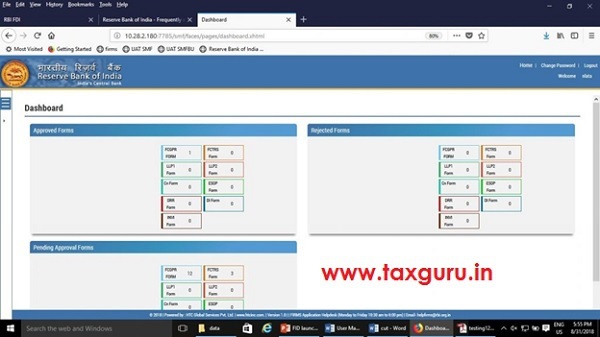
- Now Click on the left navigation button you will be able to see many options and from that select Single Master Form (ScreenShot).
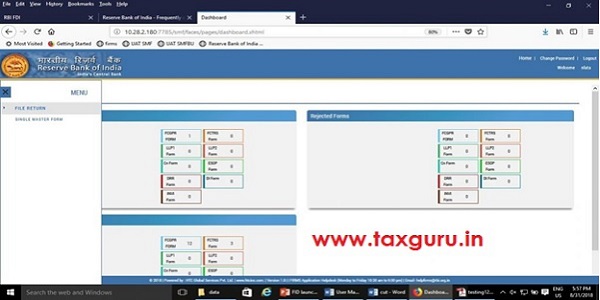
Step 4: Select the Return type- Form FC-GPR:-
- On single Master Form Click on the drop down menu “Return Type”where you will be able to see different types of forms Select “Form FC-GPR” and click on the Add new return.The user will be taken to form FC-GPR. Where certain details will be pre-filled like CIN, Company name, Pan Number etc. while some details like entry route and applicable sectoral cap/statutory ceiling will have to be filled (ScreenShot).
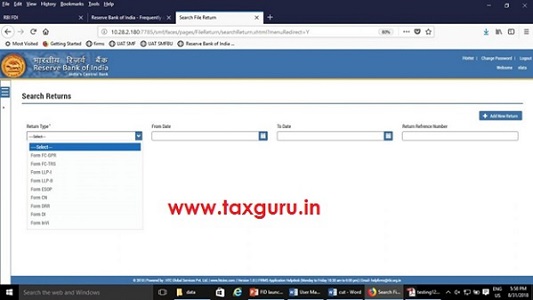
Step 5: Common Investment details.
- Then you will have to file the common investment details. These details are common to all the returns that can be reported in SMF In FC-GPR form Fill up the common investment details such as shareholding pattern, Date of issue of shares etc.
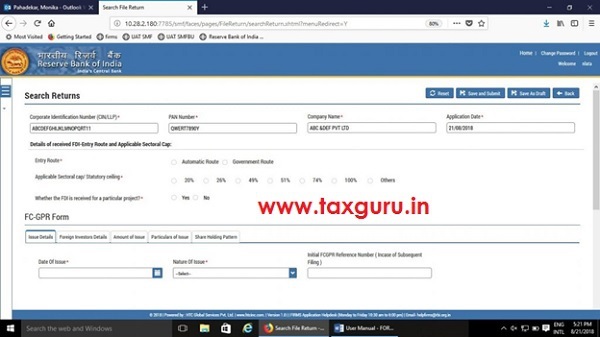
Step 6: Issue Details:-
- Issue details such as Date of Issue, Nature of Issue, Initial FC-GPR Reference No. in case of subsequent filing. Whether the change in the shareholding pattern due to this transaction being reported has already been accounted in the pre transaction shareholding pattern.
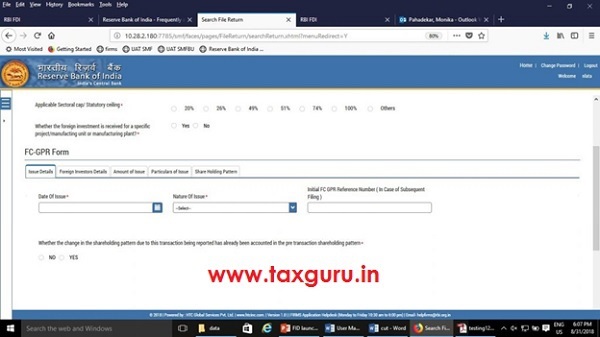
Step 7: Foreign Investment Details:-
- Foreign investors details such as Number of investors General details like Name Address Country of residence Constitution/nature of the investing entity (Specify whether)
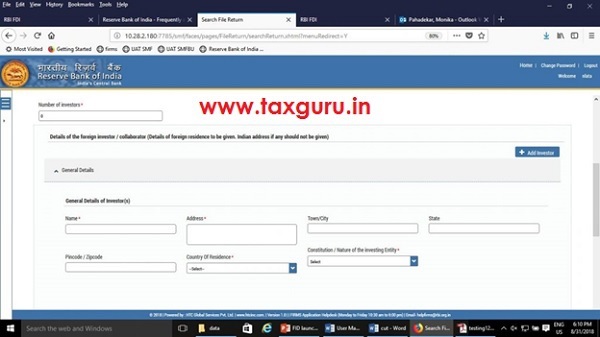
Step 8: Amount of Issue:-
- In the FC-GPR form the next thing you will have to fill in the total amount of inflow and the total amount for which the capital instruments have been issued.
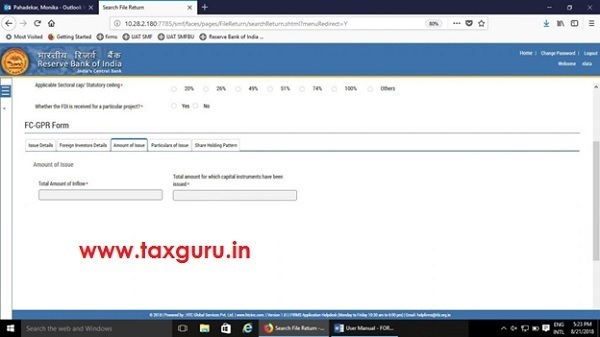
Step 9: Particulars of Issue:-
- The next step for reporting the Form FC-GPR to the RBI the next set of details would be particulars of issues.
- There would be an auto populated table for the consolidated particulars of issue.
- Fair value of issue in rupees to be filled in as per the valuation certificate issued by the authorised person along with the attachment as “valuation certificate”.
- And lastly, there would be a declaration by the BU.
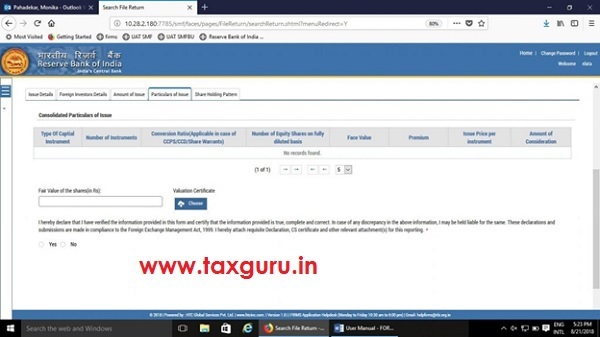
Step 10: Shareholding Pattern:-
- Value of equity shares (on a fully diluted basis) other than Foreign Portfolio Investment and indirect foreign investment or Value of Capital contribution/profit shares, Foreign Portfolio Investment, and Indirect foreign investment- Value of equity shares (on a fully diluted basis)
- Pre transaction values are auto-populated from the Entity Master (tab 3)
- Post transaction values are auto-calculated based upon the details provided in the form. Post transaction=Pre transaction value of shares + Value of shares reported in the form.
- The Business user shall ensure that the details are correctly filled in the form, so that the shareholding pattern which is auto- calculated is correct.
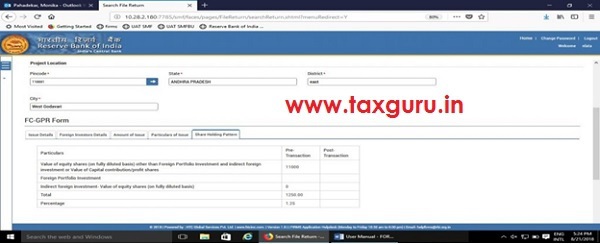
Step 11: Submitting the Form.
- After filling in all details, click on the Save and Submit for submitting the form.
List of documents to be submitted along with Form FC-GPR:-
1. Declaration : As per the format given in the RBI user manual. To be attached as “other attachments”.
2. CS certificate: As per the format given in the RBI user manual. To be attached as “other attachments”.
3. Valuation certificate:As prescribed and applicable under FEMA 20(R). To be attached at “Valuation certificate”. For rights issue, valuation certificate is not required. A declaration (plain paper) may be attached that the rights issue to persons resident outside India is not at a price less than the price offered to persons resident in India.
4. Relevant acknowledgment lettersfor FC-TRS/FC-TRS filed for the original investment for rights or bonus issue. To be attached as “other attachments”
5. Board resolution : Only the relevant extracts. To be attached as “other attachments”
6. Memorandum of Association: if applicable. Relevant extracts to be attached as “other attachment”.
7. Merger/ Demerger/ Amalgamation:relevant extracts to be attached at the specified attachment “relevant approvals from the competent authority”.
8. FIRC and KYC :at the specified attachments.
Note that only following securities are considered under FDI.
- Equity Shares.
- Convertible Preference shares.
- Convertible Debentures.
Conclusion:
The present case is about the Non resident (US citizen) wants to invest utilising his/her NRO account in shares of an unlisted private company. Since NRO account is not usable for investment purpose other than making local payments or transfer between NRO accounts. So the investor has to choose other methods of investment which is discussed above in this note. Since investment from Non Resident in an Indian Unlisted company is FDI, the transaction can be achieved by making a suitable method of investment through different payment channels other than NRO account in the present case.
Disclaimer: The contents of this article are for information purposes only and does not constitute an advice or a legal opinion and are personal views of the author. It is based upon relevant law and/or facts available at that point of time and prepared with due accuracy & reliability. Readers are requested to check and refer relevant provisions of statute, latest judicial pronouncements, circulars, clarifications etc before acting on the basis of the above write up. The possibility of other views on the subject matter cannot be ruled out. By the use of the said information, you agree that Author / TaxGuru is not responsible or liable in any manner for the authenticity, accuracy, completeness, errors or any kind of omissions in this piece of information for any action taken thereof. This is not any kind of advertisement or solicitation of work by a professional.






One can invest in Indian company through NRO account as confirmed in RBI website. I have one query whether we need to follow any compliance related to RBI? Are we need to take permission from RBi?
Kalki, You are saying one cannot invest in India from the NRO account? Are you sure? On the NSE website, it clearly says one can invest on a non reptraiable basis using the NRO account.